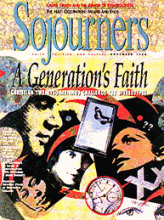Though the North American movement for justice in Central America has been well-documented through social and political histories, less work has been done on the ways the movement has transformed the hearts and souls of the people of the United States. The lives of many North Americansmyself includedwere radically changed through contact with the struggle of the people of Central America during the 1970s and 80s. Each of us can name those whose lives were inspired by songs of the pueblo, moved by the poetry of conscientized priests, humbled by the holy paintings of peasants from Solentiname, and turned upside-down through personal encounters with Central American individuals.
Demetria Martinez, a columnist for National Catholic Reporter and a poet, lays the groundwork for such a history of personal transformation in her first novel, Mother Tongue. Filled with beautifully turned phrases and profound reflections on the recent history of Central America, this book tells the story of a woman whose heart was shaped, broken, and resurrected when circumstances lead her to fall in love with a war refugee from El Salvador and into a lifelong intimacy with the pursuit of truth.
Maria was a young Chicana who barely spoke Spanish when she had her love-at-first-sight experience with José Luis as he disembarked a plane in Albuquerque. In the pursuit of her lovers heart, she comes face to face with the deep scars of war in the dark places of his soul and attempts to exorcise the enormity of his pain with her affection. In the process, María gains the inner experience that pushes her into a new life far beyond what she might have known if she had not taken the risky leap of love.
Read the Full Article
